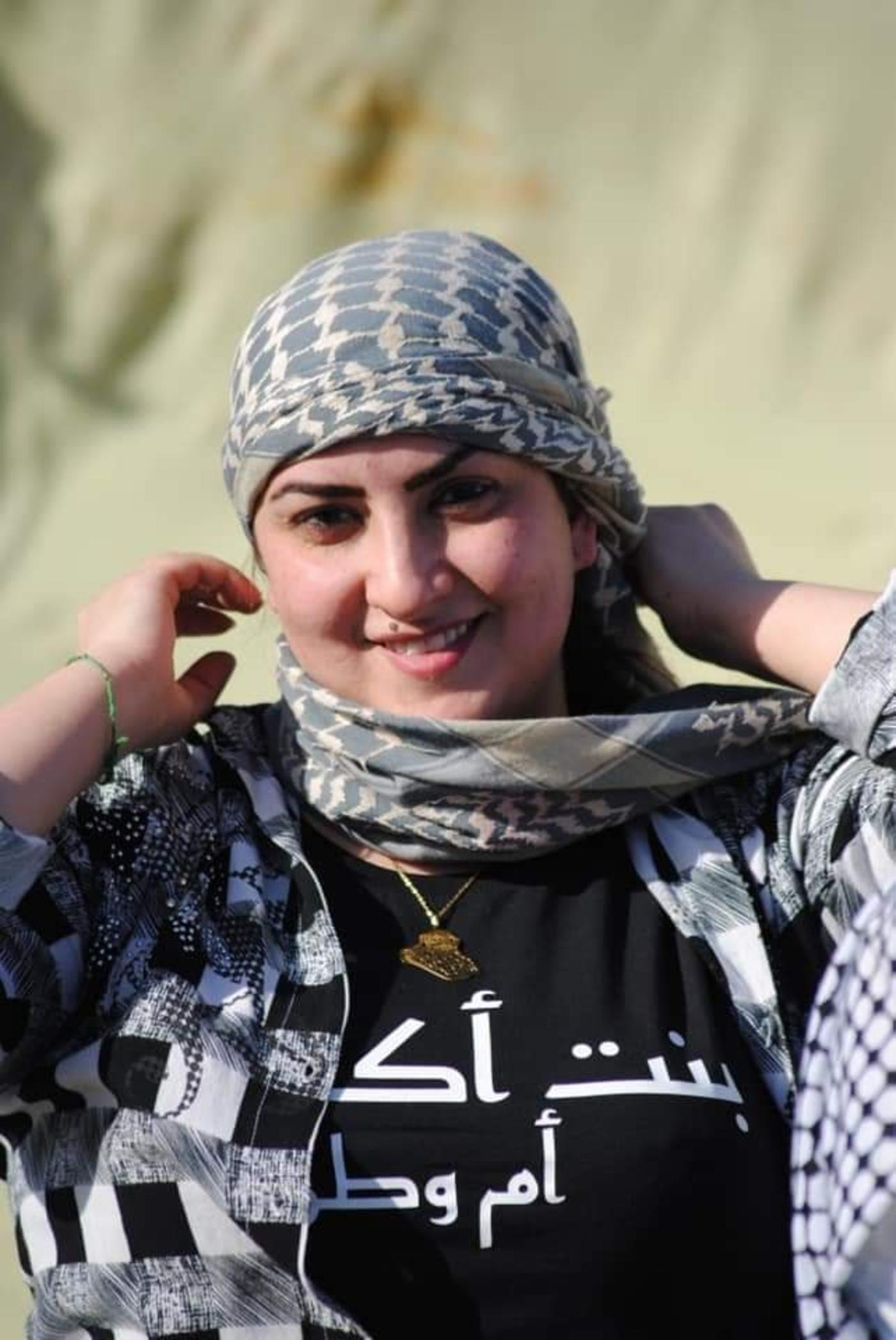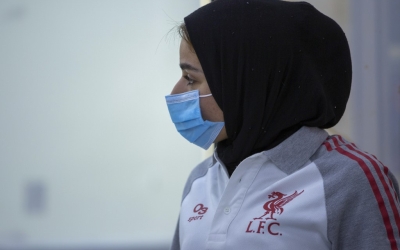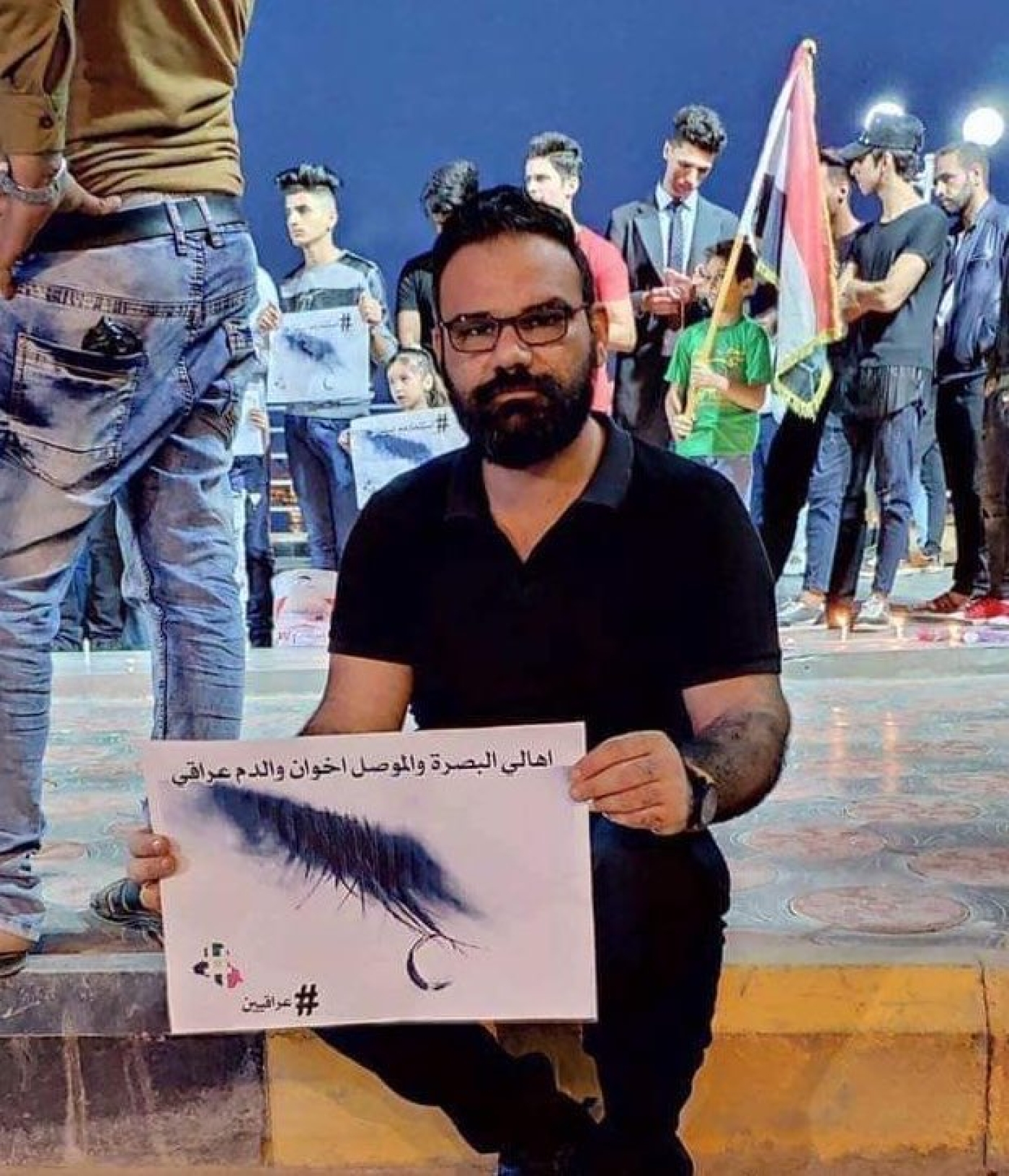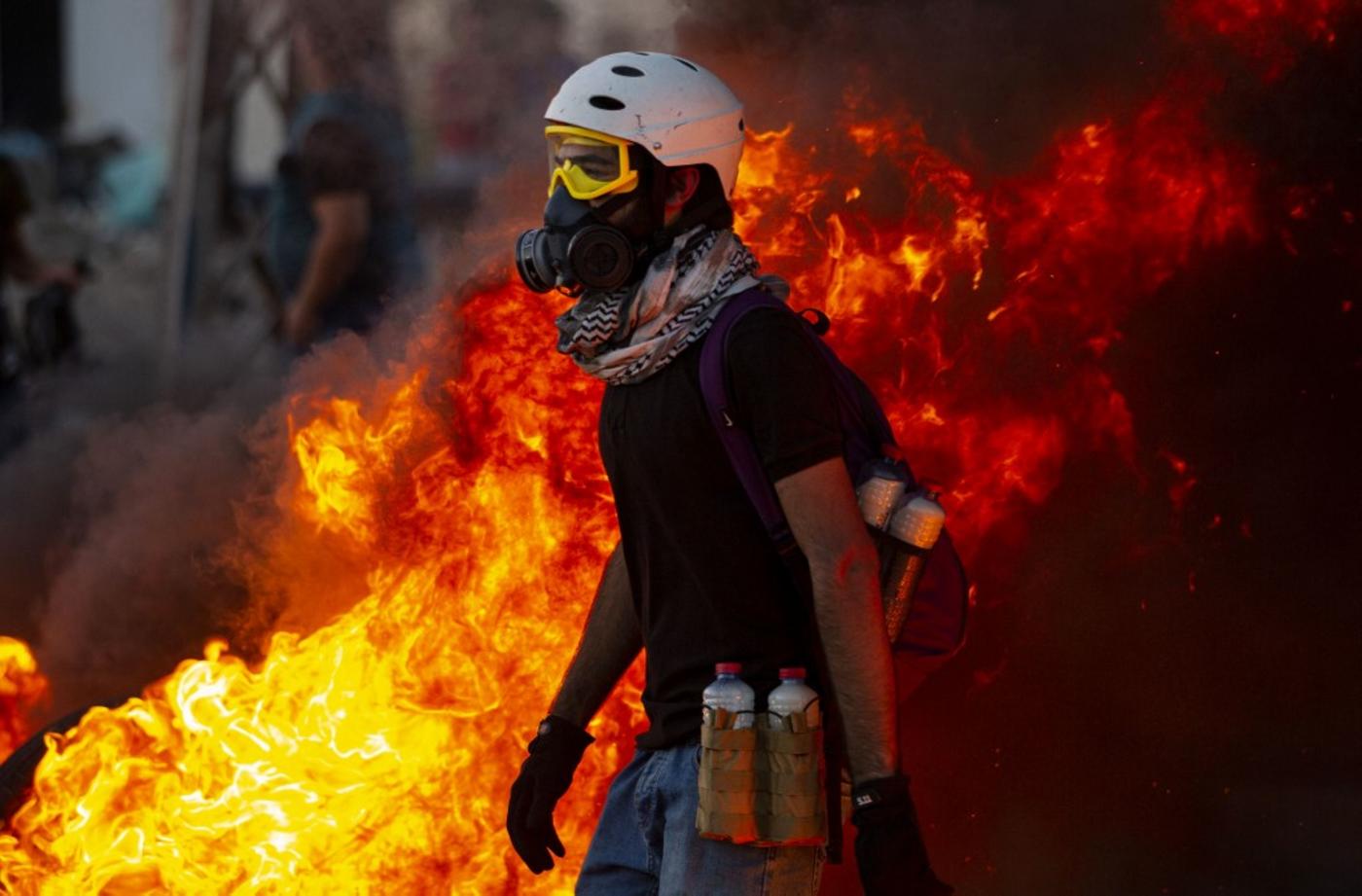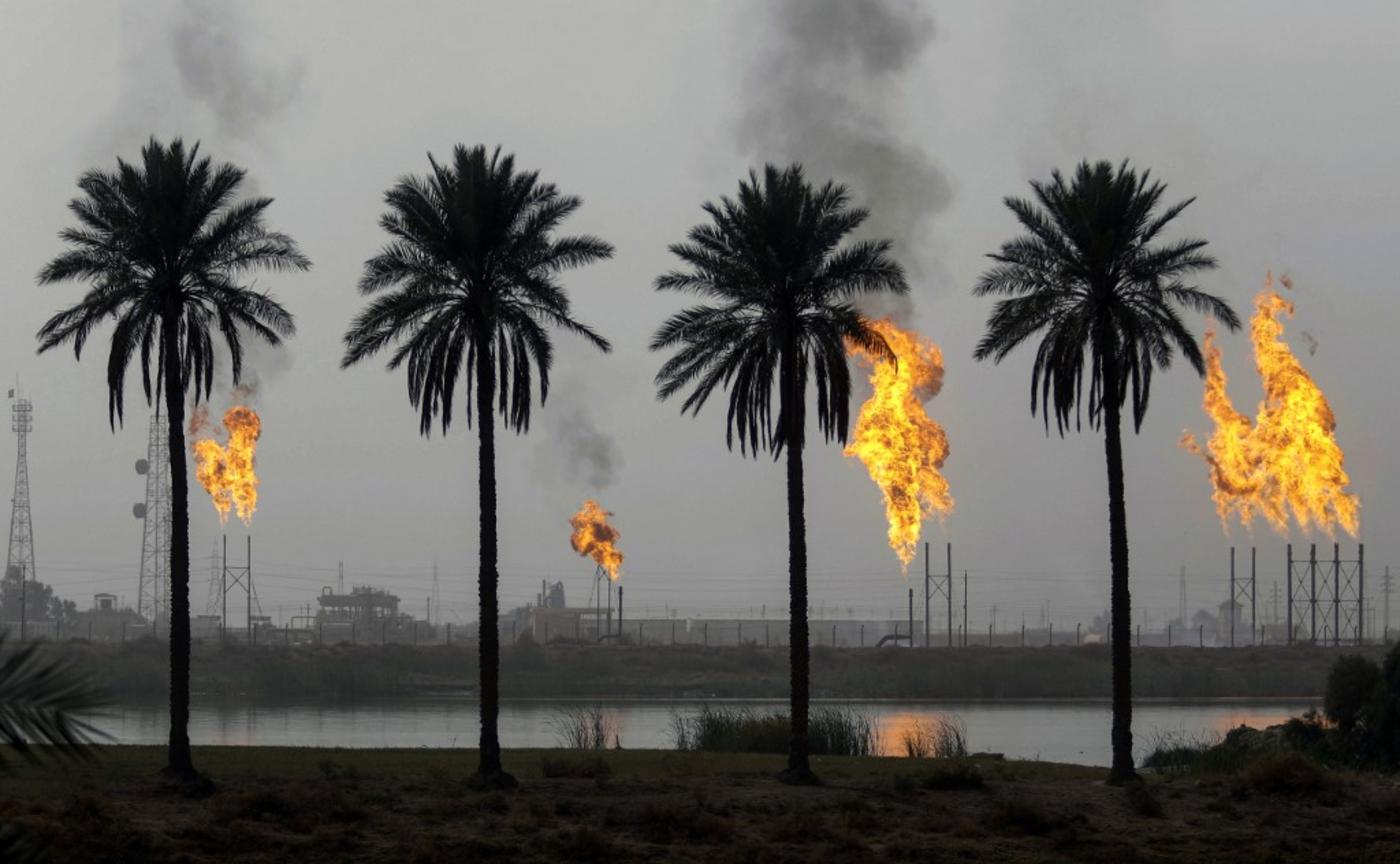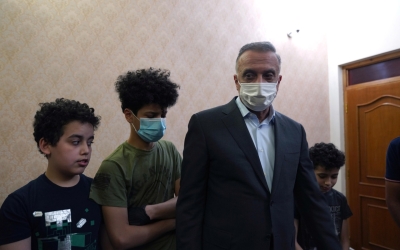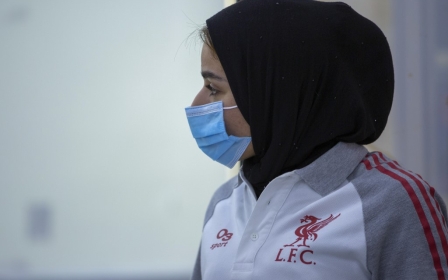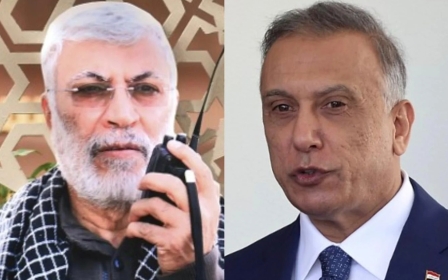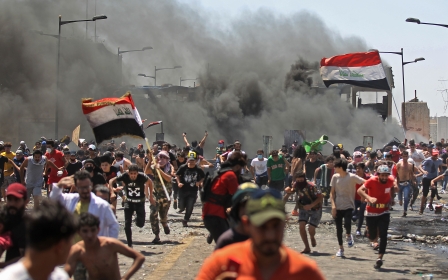Power and protest: Who ordered the killing of Basra's activists?

It was past 5pm when Lodia Raymond, 27, a prominent protest activist, left her parents' home in the Kut al-Hajjaj neighbourhood in Iraq’s southern oil hub of Basra and noticed a white car heading towards her.
Raymond continued walking towards the main street, where two other activists, Fahd al-Zubaidi and Abbas Sobhi, were waiting for her in Zubaidi’s car, without taking her eyes away from the slowly approaching car.
Unusually, Raymond, who is a Christian, was wearing a headscarf and abaya. The three were on their way to the funeral of Tahseen Osama al-Shahmani, another local protest organiser who had been killed three days earlier on 14 August.
The car was about five metres from Raymond, she recalls, when she saw four men inside with their faces concealed behind medical masks and black caps. As it got closer she noticed the driver pull out a weapon as if about to shoot her.
New MEE newsletter: Jerusalem Dispatch
Sign up to get the latest insights and analysis on Israel-Palestine, alongside Turkey Unpacked and other MEE newsletters
“I ran towards Fahd's car. It was about 10 meters away. I opened the back door and rolled inside and asked Fahd to hurry away,” Raymond told Middle East Eye.
The seconds that followed were very long. One of the four men got out of the car and started shooting as Zubaidi drove off.
“I didn’t notice that I was injured in my leg. I was so scared and didn’t notice that I left the car door open,” said Raymond.
When the sound of the bullets had stopped and the car was far away, the three noticed that Sobhi was also injured in his back.
Protests and panic
The incident, which happened three days after the killing of Shahmani inside his office in central Basra with more than 20 bullets, sparked panic among local demonstrators and activists.
It brought to mind last year’s bloody crackdowns in Baghdad and nine southern Shia-dominated provinces that ended with the killing of hundreds of demonstrators, activists and journalists, and the wounding of thousands more, according to human rights groups.
Anti-government protests, which had been halted for months because of the coronavirus pandemic, had begun again last month in several southern provinces, with calls for the killers of the demonstrators to be identified and brought to justice.
In Basra, the protests attracted a sizeable crowd, but the gatherings were peaceful, with no reports of clashes or confrontations with security forces.
However, the killing of Shahmani angered everyone and turned the situation upside down. Demonstrators blocked roads on the two days that followed and demanded the dismissal of the police chief and the governor and their trial for "their collusion with the killers and their lack of seriousness in stopping the targeting of activists”.
Persisting in a show of anger, the demonstrators went to the neighbouring al-A’ashar area where the house of the governor is located and set it on fire using petrol bombs.
Hours after the failed assassination attempt on Raymond, Mustafa al-Kadhimi, the Iraqi prime minister who was in Washington for talks with US officials, issued an order to dismiss the police chief and the director of the National Security Bureau in Basra for "neglecting their duties and failing to secure the lives of people," according to one of his advisers.
Less than 48 hours later, with Kadhami struggling to get a grip on the situation from the US capital, gunmen in a white car intercepted Riham Yacoub, a 29-year-old former activist and one of the most popular influencers in Basra, as she was driving on the city’s main commercial street from the sports centre that she ran, killing her in a hail of bullets.
Offices set ablaze
Amid spreading alarm, accusations over the killings were directed at armed Shia factions linked to Iran in particular, as they had previously led campaigns through their media outlets against the targeted activists, accusing them of working with US diplomatic missions “to undermine security in the south and ignite Shiite infighting”.
The assassination of Yacoub exacerbated existing tensions with angry demonstrations also being held in other southern governorates.
'The situation was very critical, and it was clear that one of the political players had crossed all the red lines in Basra'
- Shia politician
Protesters in Basra burned down a parliamentary office the next day, while demonstrators in Nasiriyah, 400 km south of Baghdad, set fire to offices used by Shia political groups and armed factions and demolished them with bulldozers.
Amid growing chaos and anger, some called for the demonstrators to form armed groups under the pretext of the government's inability to protect them.
“It was clear that some of these calls were angry reactions to the killings, but some of them were intended to deflect peaceful protests and legitimise striking at the demonstrators,” one of Kadhimi’s advisers told MEE, talking on condition of anonymity.
“Our fear was that one of the conflicting parties would take advantage of these calls to strike the demonstrators, despite our knowledge that they would not turn into reality.”
Kadhimi, who left Washington on 22 August, asked his plane’s crew to fly directly to Basra, but that was not possible “for technical reasons related to the flight paths”.
He stopped in Baghdad for just few hours, before flying on to Basra, accompanied by the ministers of interior and defence, the head of the National Mobilisation Authority, the head of the National Security Service, the head of the Counter-Terrorism Service, the chief of staff of the army, and other military and security leaders.
“The situation was very critical, and it was clear that one of the political players had crossed all the red lines in Basra,” a prominent Shia politician, also speaking on condition of anonymity, told MEE.
"All the signs were indicating that the situation was inflamed in the south and that another incident would burn everyone and ignite a civil war.
“Kadhimi had to do something to defuse the crisis, especially as he has great influence on the demonstrators there.”
Oil, smuggling and organised crime
By some measures, Basra is one of the richest cities in the world.
Iraq's third-largest city in terms of population is located on the west bank of the Shatt al-Arab, 600km south of Baghdad, bordered to the south by Kuwait and Saudi Arabia and to the east by Iran.
It is the access point to some of the largest and most lucrative oil fields on the planet, producing about 3.2 million barrels per day.
Hundreds of local and foreign oil and commercial companies have offices in the city. But it is also a hub for organised crime gangs involved in smuggling weapons, drugs and oil throughout Iraq and the region.
Whoever controls Basra is able to twist the arm of the federal government. It has been an arena of conflict between local, regional and international powers operating in Iraq since the 2003 US-led invasion.
The destabilisation of Basra is therefore in the interest of many local and foreign conflicting parties in Iraq. But the killings in the city had left many wondering the same thing: who was trying to drag the government into an unequal fight with the Iranian-backed factions, and why now?
‘Criminal mercenaries’
CCTV recordings obtained by the police showed that the car used by the group that attempted to assassinate Raymond was also present at the locations where Shahmani and Yacoub were killed, two Iraqi officials familiar with the investigation told MEE. (Many initial media reports of the attack cited s0urces reporting that Yacoub was shot by gunmen on a motorcycle).
The car was an old Toyota Crown, and had forged plates. But that detail and the tactics used in the three attacks only raised more questions for investigators about the identities of the perpetrators.
'All the information available so far indicates that they are a group of mercenary criminals who were hired to carry out these killings'
- Iraqi federal official
The Iranian-backed Shia armed factions do not use this type of car, and the manner of the killings was completely different to how they usually carry out such operations, officials said.
Despite an intensified security operation and stepped up efforts to detect and prosecute the killers, the first week passed without any further progress.
But the second week brought a major breakthrough. The intelligence services had succeeded in tracking down two suspects who had been collecting information about activists and demonstration organisers.
An investigation into the two men, who were arrested last week but have not yet been charged, revealed that they had a hit list including the names of six prominent activists, according to officials familiar with the ongoing investigation.
Three of the six targeted activists were supporters of the influential Shia cleric Muqtada al-Sadr while the others were close to groups and individuals linked to Kadhimi.
“The defendants provided a lot of information. It is certain that they were part of the group that carried out the three assassinations [in Basra], but we have not yet reached the party that employed them,” one federal official told MEE.
“All the information available so far indicates that they are a group of mercenary criminals who were hired to carry out these killings.”
Two of Kadhimi’s advisers, a senior local official in Basra, an intelligent officer involved in the investigations and two members of parliament contacted by MEE confirmed that the perpetrators of the three attacks “were criminal mercenaries”.
“Unfortunately, we haven't gotten to the real killers yet. It seems that the real instigator of these assassinations is using a new tactic by hiring killers who have criminal records,” one of Kadhimi’s advisers told MEE.
“It is clear that this party does not want to appear in the picture, so it used regular criminals who could not be linked to it if the authorities reached them.
“The same tactic was used in the assassination of Hisham al-Hashemi," they said, referring to the prominent expert in militant groups who was assassinated in June in Baghdad in front of his home.
Struggle for dominance
Iraqi officials and politicians believe that the causes of conflict in Basra have been the same for more than a decade and a half, but that two new factors could now inflame the situation: the recent dismantling of the system of provincial councils, and Kadhimi’s efforts to bring the province under the full control of the government in Baghdad and to strengthen his own political position.
Iraq’s parliament voted to abolish provincial councils last October in response to calls by protesters for political reforms and complaints about corruption.
But the move means that the governor of Basra has the final say on spending tens of billions of dollars that reach the governorate from the annual budget, as well as half of the revenues from local border crossings and five percent of the value of oil produced in the province.
Many political forces accuse the current governor, Asad al-Eidani, and his allies of stoking disorder and using protest groups to target his opponents in order to strengthen his own position, although similar accusations have also been levelled at some of Eidani's opponents.
'There is also a foreign will working to destabilise the situation in Basra... [and] the demands of peaceful demonstrators have been exploited by some sides'
- Mouin al-Hassan, Basra governor's spokesperson
MEE asked Eidani's office for comment on those allegations.
Mouin al-Hassan, an official spokesperson for the governor's office, said: "The city of Basra suffers from many political and social challenges, tribal disputes, neglect and unemployment.
"There is also a foreign will working to destabilise the situation in Basra... [and] the demands of peaceful demonstrators have been exploited by some sides."
Farhad Alaaldin, chairman of the Iraq Advisory Council, told MEE that it was natural that there should be a struggle over influence and revenues in the province.
“Basra is the most important and largest economic centre in Iraq, and 90 percent of Iraq's oil exports come from Basra. The province’s funds are equal to the money of the other provinces combined,” said Alaaldin.
“It is no secret that the political and armed forces have expanded their economic interests in Basra and are afraid of any attempt by governmental or non-governmental parties to limit their influence or diminish their sources of income.”
From protest to elections
Kadhimi's announcement of the government's intention to hold national parliamentary elections in June 2021 without first consulting the influential political blocs provoked his rivals and detonated the dormant volcano, politicians and observers said.
Seven out of 11 targeted activists, including Shahmani, Raymond, Sobhi and Zubaidi, are associated with Kadhim al-Sahlani, the prominent leader of demonstrations who was appointed as chairman of the Supreme Commission for Coordination between Governorates in Kadhimi’s government.
Sahlani had been in contact with them in the last few months to finalise their efforts to form a political party in preparation for the upcoming elections, local activists involved in the talks told MEE.
Many meetings had been held in Baghdad and Basra to discuss the details and the project was in its final stages.
Sahlani declined to comment on these details.
Yacoub, who had completely retired from demonstrations and political activities in 2018 after being subjected to threats over her attendance at an International Women's Day celebration held by the US Consulate in Basra and the spread of a photo she posed for with the US consul at that time, was one of the potential candidates for the Kadhimi team.
'The assassinations were aimed at depriving the new political organisation of important young leaders who could be relied upon in mobilising for the upcoming elections'
- prominent activist
A close friend of Raymond, the two women had been together hours before Yacoub was killed, Raymond told MEE.
“The assassinations were aimed at depriving the new political organisation of important young leaders who could be relied upon in mobilising for the upcoming elections,” a prominent activist close to Kadhimi told MEE.
“They [the killers] are looking to undermine confidence in the government's ability to secure elections and candidates.
“This means encouraging calls to boycott the elections, serving the current political forces and causing new parties to lose.
“We are determined to return Iraq to the path of the state despite all the threats, challenges and obstacles. We have no choice but to win.”
This article is available in French on Middle East Eye French edition.
Middle East Eye delivers independent and unrivalled coverage and analysis of the Middle East, North Africa and beyond. To learn more about republishing this content and the associated fees, please fill out this form. More about MEE can be found here.


